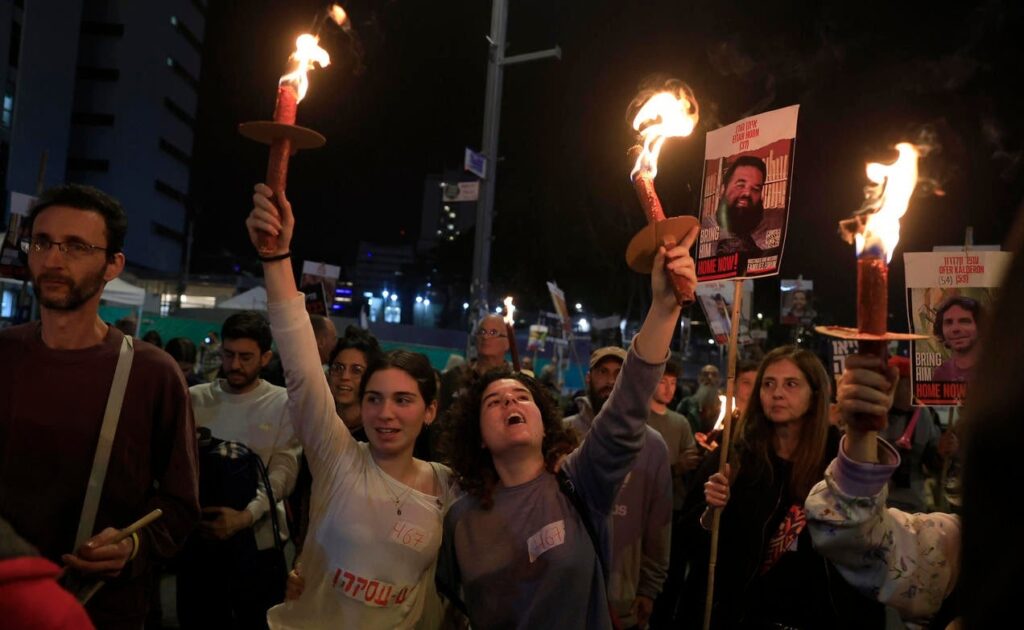
Israel, Hamas reach deal on Gaza ceasefire, hostage release
Amid discontent over Gaza, more Israelis back hostage deal
In recent weeks, thousands of Israeli reservists and security forces retirees have signed petitions calling on the government to prioritize the release of hostages over the fight against Hamas.
Every week, large crowds gather in cities across Israel to call on the government to bring home hostages held in Gaza.
The hostages’ fate has been on many Israeli minds since the Hamas-led attacks on Israel on October 7, 2023, which killed 1,200 people. Recent opinion polls show that nearly 70% of Israelis want a deal to bring home the remaining 59 hostages of the around 250 taken during the attacks, 24 of whom are still believed to be alive, DW reports.
Now, a growing number of Air Force pilots, former Secret Service agents, intelligence unit members and many other army reservists and retirees are publicly expressing growing discontent with the government’s failure to secure the hostages’ release. Their message: First the hostages, then Hamas, even if war is necessary later. Israel, the United States, Germany and several other countries designate Hamas a terrorist organization.
A group of 250 former Mossad foreign intelligence agency officers has backed a recent initiative by Air Force pilots and air crews.
“We will join the call to act immediately to reach an agreement to return all 59 hostages home, without delay, even at the cost of cessation of the fighting,” their open letter read.
The letter concluded with a message to Prime Minister Benjamin Netanyahu directly: “The sanctity of life, Mr. Prime Minister, takes precedence over God of vengeance,” in reference to Psalm 94.
Israel resumed military operations in Gaza on March 18 after negotiations over the second phase of a ceasefire agreement with Hamas broke down. The first phase saw the release of nearly 40 Israeli and foreign national hostages from Gaza, and Israel freed nearly 2,000 Palestinian prisoners in exchange.
For Haim Tomer, a former Mossad head of division with decades of service, the government’s decision to break the ceasefire and renew its military offensive was one his reasons for speaking out.
“People started to ask themselves how long we go with this war before we get our hostages back,” Tomer told DW. “The idea of our public letters is to tell the Israeli public that the government is going in the wrong direction [and] that this direction will not bring back the hostages. Hostages can die every day.”
The Air Force officers, reservists and retired staff who started the campaign of open letters accused Netanyahu and his government of putting the lives of the hostages and the lives of soldiers at risk for his own political gain.
“At this time, the war serves mainly political and personal interests and not security interests,” they wrote. “Continuing the war does not contribute to any of its declared goals and will lead to the deaths of the hostages, of IDF soldiers and innocent civilians and to the exhaustion of reservists.”
Avner Yarkoni, who has served as a fighter pilot for 35 years and as head of Israel’s Civil Aviation Authority, said that while the war was initially justified, many now feel it is going nowhere.
“We eventually figured out that the prime minister would like to stretch this war on forever,” Yarkoni told DW. “Once we stop the war, there will be two issues: Elections and a commission of inquiry. And then he won’t be prime minister anymore.”
Critics have also pointed out that Netanyahu’s decision to return to war and not negotiate the second phase of the ceasefire agreement with Hamas was driven by his need to keep his far-right coalition partners in government. They threatened to quit the government if the war ended, a move that could bring down Netanyahu’s coalition.
“I served 40 years for the state of Israel … and I can say while looking in the eyes of the prime minister or any minister: ‘You are wrong in regard to the ways to secure the future of Israel,'” said Tomer, the former Mossad officer.
Many argue that only negotiations have led to the release of large numbers of hostages throughout the war. They say the government’s strategy of “maximum military pressure” is endangering the lives of hostages.
“Because we are pilots…. fighting Hamas while they are holding hostages is like fighting with your hands cuffed,” said Yarkoni, the former fighter pilot.
